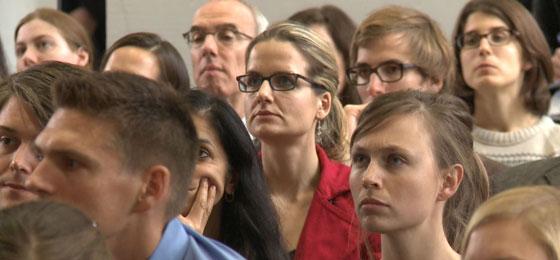Giving young researchers the chance to prove themselves

Encouraging talented young people to pursue a research career is one of the SNSF’s top priorities. By consistently implementing measures designed to improve the basic conditions for up-and-coming scientists, the SNSF is delivering on its promises. But this action alone is not enough.
In order to ensure that the Swiss research scene, with its leading international position, is able to continue to hold its own, the option of pursuing an academic career must be made more attractive to young researchers in Switzerland. This is something the SNSF firmly believes in. With this in mind, one of the main focuses of its Action Plan for 2013 to 2016 lies in securing the next generation of scientists, with a series of appropriate measures already having been agreed and/or introduced:
- Mobility grants for doctoral students; since June 2012
- Newly designed mobility fellowships (Doc.Mobility, Early Postdoc.Mobility und Advanced Postdoc.Mobility); since 2013
- Doc.CH for the humanities and social sciences; since 2013
- 120% support grants for postdocs; since June 2013
- Salary increases for doctoral students; from 2014 onwards
- Return option in the case of Advanced Postdoc.Mobility fellowships, from 2014 onwards
Career-oriented funding
In order to create clearer conditions and more flexibility, the SNSF has reorganised its system of mobility fellowships for periods spent abroad with effect from 2013. The time spent abroad can now be divided into individual stays, and the age limits have been made more flexible in order to take better account of individuals’ personal situations. The Doc.CH scheme, introduced at the same time, enables doctoral students in the humanities and social sciences to write a doctoral thesis on a subject of their own choice in Switzerland. Finally, in the case of the Advanced Postdoc.Mobility fellowships, researchers can now plan for a return to a research institution in Switzerland thanks to the newly introduced "return grant".
Targeted support for project collaborators
The mobility grants introduced back in 2012 now enable doctoral students employed in SNSF projects to spend a period of six to twelve months abroad. Additionally, the SNSF is increasing doctoral students’ salaries by around 7% with effect from 1 January 2014, and a new "protected time" of at least 60% of a full time position is to be introduced for preparation of the doctoral thesis. Finally, the 120% support grant for postdoctoral researchers is aimed at making it easier for individuals to reconcile their academic career with family commitments. The researcher’s own working time may be reduced, and a support member of staff hired.
Through all of these measures the SNSF is looking to help ensure that academic careers in Switzerland are seen as a more attractive prospect and to give young researchers an opportunity to prove themselves at the key moment in their career path. However, this alone is not enough to ensure a long-term improvement in the situation. In order to create the right incentives for the optimum promotion of young researchers, the SNSF and institutions of higher education will have to work together even more intensively.